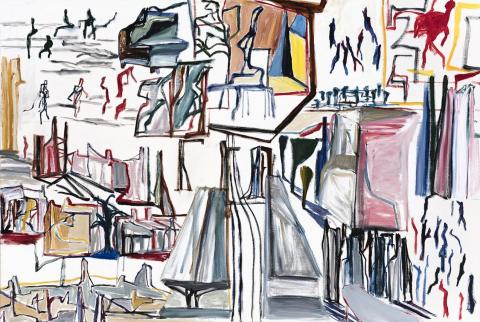PERUGIA, RAILWAY STATION, FOOTBALL TEAMS, RAG & BONE MAN, ETC., 1982
KEN WHISSON
oil on canvas
80.0 x 119.0 cm
Watters Gallery, Sydney
The Estate of the late James O. Fairfax AC, Sydney
Ken Whisson, Watters Gallery, Sydney, 2 – 19 May 1984, cat. 3
Wardell, M., ‘Ken Whisson, St Kilda to Perugia’, Art and Australia, vol. 22, no. 2, Summer 1984 (illus. on front cover)
Ken Whisson’s career can be divided into two periods: work made prior to his move to Italy, and those works painted in Italy between 1977 and 2016.
Prior to his departure for Italy in 1977, Whisson lived in the Melbourne bayside suburb of St Kilda. By 1982, Whisson had been living in Italy for five years and the familiar views of St Kilda were a distant memory, but it was the works he had created during these years which provided the platform for the Italian works that followed.
Arguably one of the artist’s finest works from his St Kilda period is Disembarkation at Cythera (idiot wind), 1976. Here the artist is on record as mashing-up the idea of Jean-Antoine Watteau’s baroque masterpiece of the same title with a Bob Dylan song from his 1975 album, Blood on The Tracks - Idiot Wind1. Blood on The Tracks is an incredibly painterly album – its complex images laden with memories, reflections and narratives jostle for prominence against slabs of landscape. Together they unravel against the backdrop of Dylan’s guitar and raw harmonica. The songwriter’s structuring of prose to create images in the songs included on Blood on the Tracks fitted with Whisson’s interest in depicting time past and present, as well as his own developing interest in the layering of images. Dylan explained his approach to the album simply, ‘it was just a concept of putting in images that defy time – yesterday, today, tomorrow’.2
Perugia Railway Station, Football teams, Rag and Bone Man, etc, 1982, combines Whisson’s central themes to date and is perhaps one the finest works created during his Italian period. The scope of subject, as the title suggests, indicates that this is a major work. The railway station with its platforms, awnings and signals is clearly recognisable in the foreground and the placement of the railway tracks in the centre of the work is crucial. They both draw our eye into the composition and lead us on a journey through the painting, as well as evoking perspective and distance. On the train, and arrested in time, we traverse the Italian landscape. As we travel we see sporting events, factories, houses and trees. Fellow passengers are recalled in visceral detail… Time passes, and the images unfold in the traveller’s eye as each of the characters or forms plays their part. Together they create a recollection of the journey.
However meandering and seductive these interpretations are, it is of course all conjecture. Whisson’s works are complex; they puzzle many and polarise opinion. They operate on a level of their own so deeply rooted in memory that he has said his paintings reveal memories that he himself cannot recall: ‘Certainly my paintings have a much better memory than I do for the things I’ve seen’.3
Perhaps to the title Perugia Railway Station, Football teams, Rag and Bone Man, etc, Whisson could have added Tangled up in Blue – another evocative, epic travelling tale from Dylan’s Blood on the Tracks album. But perhaps he felt that the title was already long enough…
1. Barkley, G., and Harding, L., Ken Whisson: As IF, Museum of Contemporary Art, Sydney, 2012, p. 20
2. Creswell, T., 1001 Songs, Hardy Grant, Melbourne, 2007, p. 24
3. The artist, cited in Ken Whisson Paintings 1957-1985, Broken Hill City Art Gallery, Broken Hill, 1985, p. 19
HENRY MULHOLLAND
